Thursday, August 18th 2016

AMD Demos Breakthrough Performance of the ZEN CPU Core
At an event last night in San Francisco, AMD provided additional architectural details and a first look at the performance of its next-generation, high-performance "Zen" processor core. AMD demonstrated the "Zen" core achieving a 40% generational improvement in instructions per clock, delivering a landmark increase in processor performance.
During the event, AMD demonstrated an 8-core, 16-thread "Summit Ridge" desktop processor (featuring AMD's "Zen" core) outperforming a similarly configured 8-core, 16-thread Intel "Broadwell-E" processor when running the multi-threaded Blender rendering software with both CPUs set to the same clock speed. AMD also conducted the first public demonstration of its upcoming 32-core, 64-thread "Zen"-based server processor, codenamed "Naples," in a dual processor server running the Windows Server operating system."The performance and efficiency of our 'Zen' core showcases AMD at its best," said Dr. Lisa Su, president and CEO of AMD. "Over the last four years we have made significant investments to develop a high-performance, multi-generation CPU roadmap that will power leadership products. Customer excitement for 'Zen' continues to grow as we make significant progress towards the launch of new products that will span from the datacenter to high-end PCs."
The "Zen" processor core features multiple architectural advances designed to increase the performance, throughput, and efficiency of AMD's future products. "Zen" is based on a clean-sheet design and features a new cache hierarchy, improved branch prediction and simultaneous multithreading (SMT). These advances will allow the "Zen" core to scale to meet the needs of a broad range of applications, including fanless 2-in-1s, embedded systems, high-performance computing, and the datacenter."An engineer may get one chance in their career to work on a project of this size and scope, and maybe never one with as much potential to impact the future as much as 'Zen,'" said Mark Papermaster, senior vice president and chief technology officer at AMD. "With 'Zen' we aim to do what many never thought possible - deliver a 40 percent generational improvement in instructions per clock while maintaining power requirements in line with our previous generation technology."
"AMD invested where it counts, with an x86 core that can scale from PCs to high-performance servers," said Linley Gwennap, principal analyst, Linley Group. "Consumers today expect to get the most out of their systems to create transformative experiences. The versatile design of 'Zen' delivers highly-efficient performance that should provide increased computing capabilities across the spectrum - from devices to cloud computing."Expected to launch first, the "Zen"-based "Summit Ridge" desktops will utilize the AMD AM4 socket, a new unified socket infrastructure that is compatible with 7th Generation AMD A-Series desktop processors - previously codenamed "Bristol Ridge" - for exceptional performance and connectivity scalability required by AMD partners and customers. The first desktop systems featuring 7th Generation AMD A-Series processors and new AM4 sockets are scheduled to ship in the second half of 2016 in OEM PC designs.
With dedicated PCIe lanes for cutting-edge USB, graphics, data and other I/O, the AMD AM4 platform will not steal lanes from other devices and components. This allows users to enjoy systems with improved responsiveness and benefit from future-ready technologies that the AM4 platform provides with a powerful, scalable and reliable computing solution.
AMD AM4 platform key technology features include:
During the event, AMD demonstrated an 8-core, 16-thread "Summit Ridge" desktop processor (featuring AMD's "Zen" core) outperforming a similarly configured 8-core, 16-thread Intel "Broadwell-E" processor when running the multi-threaded Blender rendering software with both CPUs set to the same clock speed. AMD also conducted the first public demonstration of its upcoming 32-core, 64-thread "Zen"-based server processor, codenamed "Naples," in a dual processor server running the Windows Server operating system."The performance and efficiency of our 'Zen' core showcases AMD at its best," said Dr. Lisa Su, president and CEO of AMD. "Over the last four years we have made significant investments to develop a high-performance, multi-generation CPU roadmap that will power leadership products. Customer excitement for 'Zen' continues to grow as we make significant progress towards the launch of new products that will span from the datacenter to high-end PCs."
The "Zen" processor core features multiple architectural advances designed to increase the performance, throughput, and efficiency of AMD's future products. "Zen" is based on a clean-sheet design and features a new cache hierarchy, improved branch prediction and simultaneous multithreading (SMT). These advances will allow the "Zen" core to scale to meet the needs of a broad range of applications, including fanless 2-in-1s, embedded systems, high-performance computing, and the datacenter."An engineer may get one chance in their career to work on a project of this size and scope, and maybe never one with as much potential to impact the future as much as 'Zen,'" said Mark Papermaster, senior vice president and chief technology officer at AMD. "With 'Zen' we aim to do what many never thought possible - deliver a 40 percent generational improvement in instructions per clock while maintaining power requirements in line with our previous generation technology."
"AMD invested where it counts, with an x86 core that can scale from PCs to high-performance servers," said Linley Gwennap, principal analyst, Linley Group. "Consumers today expect to get the most out of their systems to create transformative experiences. The versatile design of 'Zen' delivers highly-efficient performance that should provide increased computing capabilities across the spectrum - from devices to cloud computing."Expected to launch first, the "Zen"-based "Summit Ridge" desktops will utilize the AMD AM4 socket, a new unified socket infrastructure that is compatible with 7th Generation AMD A-Series desktop processors - previously codenamed "Bristol Ridge" - for exceptional performance and connectivity scalability required by AMD partners and customers. The first desktop systems featuring 7th Generation AMD A-Series processors and new AM4 sockets are scheduled to ship in the second half of 2016 in OEM PC designs.
With dedicated PCIe lanes for cutting-edge USB, graphics, data and other I/O, the AMD AM4 platform will not steal lanes from other devices and components. This allows users to enjoy systems with improved responsiveness and benefit from future-ready technologies that the AM4 platform provides with a powerful, scalable and reliable computing solution.
AMD AM4 platform key technology features include:
- DDR4 Memory
- PCIe Gen 3
- USB 3.1 Gen2 10Gbps
- NVMe
- SATA Express
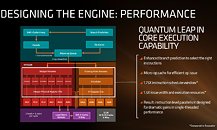
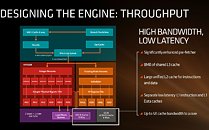
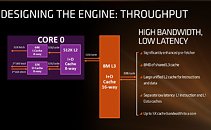
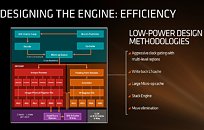
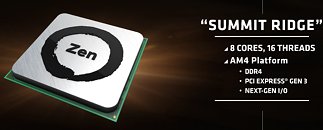
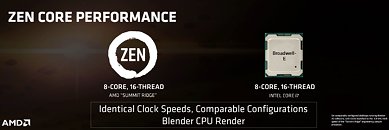
187 Comments on AMD Demos Breakthrough Performance of the ZEN CPU Core
I've been waiting patiently since I had my AMD 965 BE @ 3.8Ghz -> FX 6300 -> FX 8370.
Good thing I just bought some shares too in AMD because I have a good feeling that Zen will make heads roll.
Intel has amazing chips, but its good to see AMD stepping up the bar again and making the CPU market more competative. Granted reviews are great, I won't mind it if it beats or is on par with the $1,000 Intel CPU. This is great because the AMD Zen will probably retail between $200-$350. Looks like I will be upgrading Q1 2017!
www.techpowerup.com/138328/bulldozer-50-faster-than-core-i7-and-phenom-ii
1. AMD has overcome its processors with this by a mile it seems.
2. AMD tried something new/different with Bulldozer which in the end did not really pay off, but I can only applaud the effort, I wish a lot LOT more developers of everything would try different new technologies.
(Intel project larrabee for real time ray tracing, where is my real time raytracing, why is everything polygons for forever now since we used to have other tech as well like Vector graphics, explore damn it, explore!)
3. Intel only has to overcome its own processors and with all due respect barely has done that since the 2600k probably because of the lack of competition but that does not change that fact.
I'm pretty confident that the ZEN will compete, if not now then in any other second refresh of those ZEN CPU's. The baseline is set. They need to work, refine and perfect that design.
Due to my PC usage, rendering, I am close on pulling trigger on purchasing 5820K or an 12core ES Xeon chip from China with a X99 board.
If Zen is even remoteply competitive with Broadwell-E with a clear price advantage, it's somethig I'd consider. However, I will not trust any claims and benchmarks from either camp because the history has shown they can never be trusted especially AMD claims.
I want reviews from several independent websites and make my own conclusion before pulling the trigger.
Which means this AMD's demo is like water off a duck's back.
I hope they will deliver what they have promised, but I'm not holding my breath.
ark.intel.com/products/94196/Intel-Core-i7-6900K-Processor-20M-Cache-up-to-3_70-GHz
I think you are the one that needs a history lesson :p
I used to own AMD 4x4 platform and its CPUs were as much as (but were cheaper, yes) Intel's Pentium Xtreme edition CPU.
On the other hand, it's useless to make CPU for upper high-end market alone. It's on the low and mid end where the 'good stuff' happens. Where the main consumers and businesses are who need a decent computer.
Just as the RX 480, sitting on 220$ up to 260$ avg still offering -5 to -10% performance compared to the much more expensive 1060.
Higly clocked 8+ cores from Intel is too expensive today, but models with low clocks are actually bargains already, like the E5-2630 V4 2.2 GHz, 10 cores at $667 or the E5-2620 V4 2.1 GHz, 8 cores at $417.
Very odd SATA port placement of at least two of the ports.